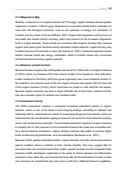P a g e | 32 4.1.3 Magnesium (Mg) Similarly, compared to non-organic bananas (977.02 µg/g), organic bananas showed greater magnesium contents (1,269.47 µg/g). Magnesium is a powerful mineral that is necessary for more than 300 biological processes, such as the synthesis of energy, the contraction of muscles, and the control of nerves (Pittman, 2021). Organic farming places a strong focus on soil health and natural nutrient recycling, which may account for the increased magnesium level in organic bananas. These results are consistent with research showing that, because organic soils have higher microbial activity and better nutrient retention, organic farming may increase the amount of minerals in crops (Van Eerd et al., 2021). Increased magnesium levels benefit muscular health and energy metabolism, which is another reason why consumers should think about choosing organic products. 4.1.4 Moisture and Ash Content Bananas that were organic had a little greater ash content (0.196%) than non-organic bananas (0.160%), which is a measure of the total mineral content. Even though it's a tiny distinction, it adds credence to the theory that fruits grown organically have more nutritional content. In the meantime, the moisture level of the non-organic bananas was greater (92.4%) than that of the organic bananas (91.6%), which could have an impact on their shelf life and texture. Because organic bananas may have a longer shelf life due to their lower moisture content, they are a sensible option for retailers and customers alike. 4.1.5 Antioxidant activity The DPPH experiment revealed a somewhat increased antioxidant activity in organic bananas, which is one of the study's most intriguing findings. According to Halliwell and Gutteridge (2015), antioxidants are critical for scavenging dangerous free radicals, which are molecules that can accelerate the ageing process and the onset of chronic illnesses including cancer and cardiovascular disorders. The increased antioxidant capacity of organic bananas is probably due to their exposure to environmental stressors like pests and competitive soil. As a natural defence mechanism, organic farming practices help plants to produce higher levels of defensive phytochemicals, such as antioxidants (Buchanan et al., 2021). Because of their greater antioxidant activity, organic bananas may offer enhanced protection against oxidative stress in addition to their mineral benefits. This may suggest that for consumers who are concerned about their health, organic bananas provide somewhat better long-term health advantages, particularly in the areas of chronic disease and inflammation prevention. Even while they won't provide the body with all the antioxidants it needs on their own, bananas can nevertheless play a big role in a diet rich in different fruits and vegetables.
